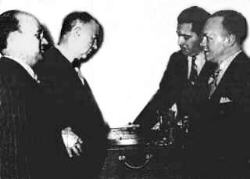Friday, January 23, 1948
Officials Help Dedicate Temple Radio Station

Grouped around a recording instrument during the dedication yesterday of Temple University's radio station in Thomas Hall are (left to right) Joseph First, vice president of Triangle Publications; Dr. Robert L. Johnson, president of Temple; Walter H. Annenberg, editor and publisher of The Inquirer and Roger W. Clipp, general manager of Station WFIL.
Temple University's new radio station in Thomas Hall at Park Avenue and Norris Street was dedicated and placed in formal operation yesterday in an afternoon and evening program, with many local radio and university officials participating.
The Thomas Hall unit, one of the most complete school installations of its kind in the country, includes two large studios for feature programs and two smaller ones for newscasting and discussions by small groups. There also are four control rooms in addition to a master control room.
AIDED BY $25,000 FUND
It serves the university's new department of Radio, Speech and Theater which was established last September after a $25,000 fund was made available to Temple for that purpose by The Inquirer and Radio Station WFIL.
The dedicatory program started at 5 P.M. with Dr. Robert L. Johnson, Temple president, officiating. Joining in the ceremony were Walter H. Annenberg, editor and publisher of The Inquirer; Roger W. Clipp, general manager of Station WFIL and other officials and representatives from radio networks, colleges, universities and a selected list of high schools in the Philadelphia area.
Dr. Armand L. Hunter, chairman of the Department of Radio, Speech and Theater, arranged the day's program which started with an open house for the students at 1 P.M. At 4:30 a special demonstration program was held and the dedication ceremony began at 5 P.M.
After the dedication, a dinner was held in Mitten Hall, where C.B. Jolliffe, executive vice president of the RCA laboratories division, Princeton, was the principal speaker..
'A MATERIAL SYMBOL'
"The close relationship established with one of our community's leading radio stations-WFIL" was seen by Dr. Johnson as "a large step" toward providing "superior educational opportunities for students who might be denied the ordinary avenues of education."
"Temple University and Radio Station WFIL," the Temple president said, "have jointly conceived and constructed on our Temple University campus these radio studios. But the studios are only the material symbol of what we hope will be a growing bond of cooperation and mutual assistance between two great agencies of public service.".
AUDIENCES BENEFIT
Dr. Johnson said there were three important ways in which both Temple and the WFIL radio audience would benefit.
"First of all, and most important," he said, "it means that our university will be able to draw on its vast resources of faculty information and learning and to bring it to you over radio and television.
"Secondly, it means that our radio educators will have an opportunity to help devise and institute new and improved educational programs on a station which has already attained an enviable record on these lines.
"Thirdly, we shall be able to provide genuine professional training for the potential broadcasters of tomorrow.".
EFFECT ON FUTURE
Dr. Joliffe predicted that television -- "mass communication of sight and sound" -- will in the future "have an enormous effect on the social and political life of our nation."
"Television development," he said, "is now out of the hands of technical men and in the hands of businessmen, educators and entertainers. Television will have its first important part in the political life of our nation during the Presidential election campaigns this year, starting with the televising of the national conventions from Philadelphia."